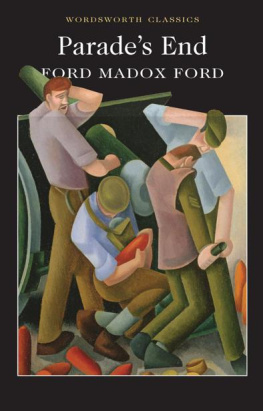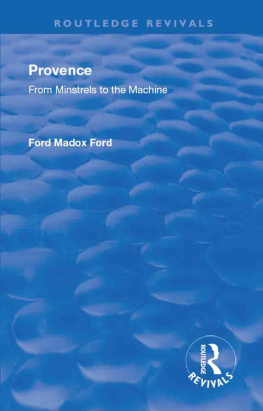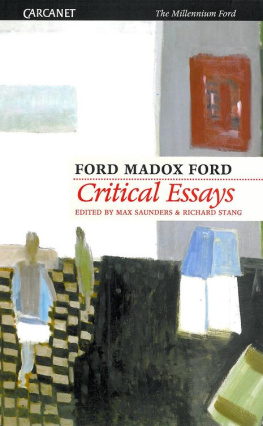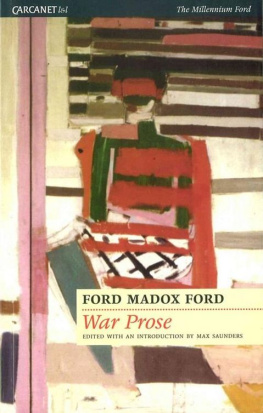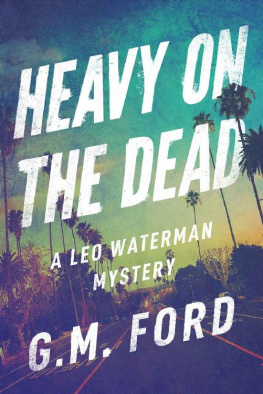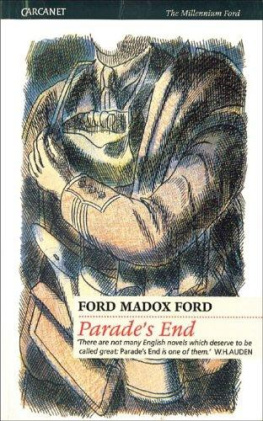Parades End
Ford Madox Ford
with an Introduction by
Robert Hampson &
Andrew Purssell

Parades End first published
by Wordsworth Editions Limited in 2013 Published as an ePublication 2013 ISBN 978 1 84870 087 1
Introduction and Notes
Robert Hampson and Andrew Purssell 2013
Wordsworth Editions Limited
8B East Street, Ware, Hertfordshire SG12 9HJ Wordsworth is a registered trademark of
Wordsworth Editions Limited Wordsworth Editions is
the company founded in 1987 by
MICHAEL TRAYLER All rights reserved. This publication may not be reproduced, distributed, or transmitted in any form or by any means, or stored in a database or retrieval system, without the prior written permission of the publishers. Readers interested in other titles from Wordsworth Editions are invited to visit our website at
www.wordsworth-editions.com For our latest list of printed books, and a full mail-order service contact Bibliophile Books, Unit 5 Datapoint,
South Crescent, London E16 4TL
Tel: +44 020 74 74 24 74
Fax: +44 020 74 74 85 89
orders@bibliophilebooks.com
www.bibliophilebooks.com
For my husband
ANTHONY JOHN RANSON
with love from your wife, the publisher
Eternally grateful for your
unconditional love
General Introduction
Wordsworth Classics are inexpensive editions designed to appeal to the general reader and students. We commissioned teachers and specialists to write wide ranging, jargon-free Introductions and to provide Notes that would assist the understanding of our readers rather than interpret the stories for them. In the same spirit, because the pleasures of reading are inseparable from the surprises, secrets and revelations that all narratives contain, we strongly advise you to enjoy this book before turning to the Introduction.
Keith Carabine
General Adviser
Rutherford College, University of Kent at Canterbury
Introduction
Ford Madox Ford was born on 17 December 1873 in Merton, Surrey, and died on 26 June 1939 at Deauville, France. In between, he became an exemplary literary figure in the community of letters in England, France and North America the three countries in which he spent his life. In 1908, he founded The English Review , a monthly magazine which published, among many now famous writers, the early work of D. H. Lawrence, Wyndham Lewis and Ezra Pound. As his biographer Max Saunders notes, Fords editing of The English Review immediately put him at the centre of literary London. [1] In retrospect, Ford can be seen as an important promoter of literary modernism in pre-First World War Britain. Reflecting this role, Pound described Fords editing of the review as the EVENT of 190910 (Kenner, p. 308). Ford moved to Paris in 1922, where he set up another modernist magazine the transatlantic review , which published fiction by Gertrude Stein, James Joyce, Jean Rhys, e. e. cummings and Ernest Hemingway (among others). [2] In that same year, Ford also began Some Do Not... , the first in the series of novels that would later be known collectively as Parades End .
The rest of Fords life was divided between Paris, the South of France and, latterly, the United States, where his reputation and influence during his lifetime were much greater than in Britain. He first visited New York in 1906, and was there almost every year from 1924 to 1930. He also made extended visits to the United States in 1937 and 1938. Although he is now best known as a novelist, he was then also well-known as a poet, and a number of major American poets including Ezra Pound, Allen Tate and Robert Lowell have acknowledged a debt to his work. [3] The rediscovery of Fords work after the Second World War began in the United States, with a symposium in the Princeton University Library Chronicle in 1948. Parades End which together with The Good Soldier (1915) figured centrally in the late-twentieth-century re-evaluation of Fords works was first published as a single volume there in 1950 (Davenport and Hampson, p. 1).
At home, however, Ford was for a long time one of the most under-rated British novelists of the twentieth century. This neglect was partly because of the amount of work he published some eighty-one books and over four hundred articles; partly because of a critical tendency to foreground his roles in The English Review and the transatlantic review and view him as an enabler of other authors careers rather than as an author in his own right; and partly because of disapproval surrounding his personal life. In 1894 he eloped with his childhood friend, Elsie Martindale, whom he married against her familys wishes. Initially, they lived together in Kent, but, after some years of marriage, they settled into a pattern of spending time apart. During 1903 Ford seems to have been having an affair with his wifes older sister, Mary Martindale. In 1909 he left his wife for the novelist Violet Hunt, and a stormy relationship ensued. Fords private life had begun to affect his professional one, and the relationship with Hunt (on whom Ford would later partly model the vindictive Sylvia Tietjens in Parades End ) created a scandal in Britain that would affect his literary reputation there for years to come. [4] During the course of this relationship, Ford also became involved, first, with the unhappily married Brigit Patmore and then, at the end of the war, with a young Australian studying art in London, Stella Bowen (who would later design the dust jackets of several of Fords works, including the first English edition of the first part of Parades End , Some Do Not... ). In 1919 he moved into a cottage in Sussex with Stella, and three years later they both moved to France, where they lived as part of an expatriate bohemian set. It was here that Ford began a relationship with the promising but unknown author Ella Williams whom Ford persuaded to change her name to Jean Rhys. Ford encouraged her writing, with Vienne, her first published story, appearing in the transatlantic review , and wrote an enthusiastic introduction to The Left Bank (1927), a collection of her stories. (Ford also seems to have dictated the third part of Parades End , A Man Could Stand Up , to her.) Rhyss debut novel Quartet (1928), based on her love-affair with Ford, presents a thinly-veiled, unflattering portrait of him in the figure of H. J. Heidler. Both The Good Soldier and Parades End grew out of and reflect this lived experience of unhappy marriages and fraught love-affairs.
1. War and its Aftermath
Not only is Parades End one of the best books about the First World War (this is a particularly crowded field: according to one estimate there were by 1930 already some 690 books about the war), but it is also perhaps the great British war novel. It was published as three linked novels, Some Do Not... (1924), No More Parades (1925) and A Man Could Stand Up (1926); Ford then wrote a fourth volume, The Last Post (1928), which moves into the post-war period and gathers together all of the loose ends as part of a narrative of post-war reconstruction. The central character in the series, Christopher Tietjens, is a composite figure based partly on Fords late friend Arthur Marwood, a Yorkshire Tory who had helped him found The English Review ; and partly on Ford himself, whose physical appearance and war service strongly echo Tietjenss own. Ford spent the early part of the war writing propaganda for the British government. In this role he published Between St Dennis and St George (1915) and When Blood is Their Argument (1915). He had left his wife for Violet Hunt in 1909, but, by 1915, it had become clear that his relationship with Hunt was also coming to an end. He enlisted in July 1915, a few months after the publication of The Good Soldier , and got a commission in the Welch Regiment (Special Reserve) in August. In June 1916, he prepared to leave for France and arrived in Rouen in July.
Next page
